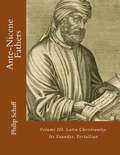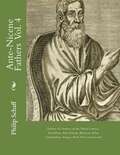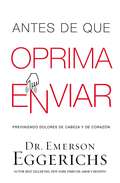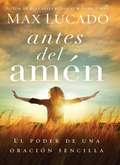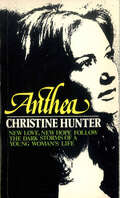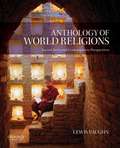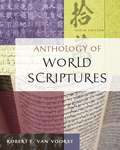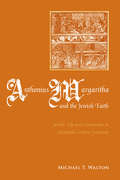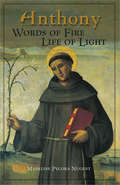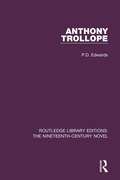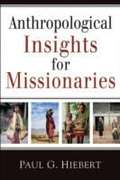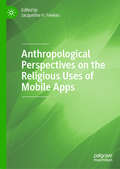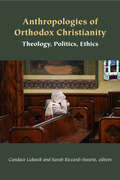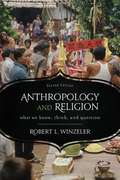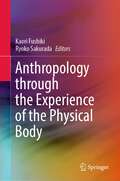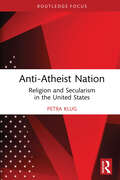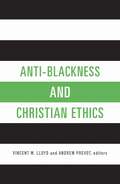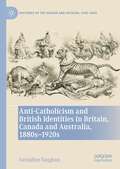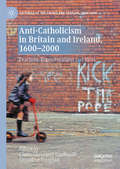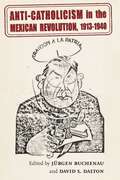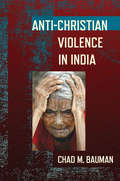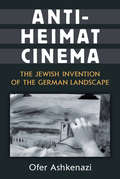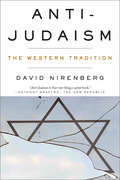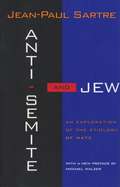- Table View
- List View
Ante-nicene Fathers: Volume III. Latin Christianity: Its Founder, Tertullian (Ante-nicene Fathers Ser. #3)
by Philip Schaff Arthur Coxe Alexander Roberts James DonaldsonVolume III. Latin Christianity: Its Founder, Tertullian
Ante-nicene Fathers: Volume IV: Fathers Of The Third Century: Tertullian, Part Fourth, Minucius Felix, Commodian, Origen, Parts First And Second (Ante-nicene Fathers Ser. #4)
by Philip Schaff Arthur CoxeVolume IV. Fathers of the Third Century: Tertullian, Part Fourth, Minucius Felix, Commodian, Origen, Parts First and Second
Antes de que oprima enviar: Previniendo dolores de cabeza y de corazón
by Dr Emerson EggerichsCada día tenemos el potencial de cometer errores al hablar y al escribir. Este libro trata de evitar los malos entendidos y facilitar compresión en la comunicación. Este libro trata acerca de cuatro cosas que debemos considerar antes de comunicar.¿Cuándo aprenderemos? A diario encontramos nuevos casos en los que las personas actuan antes de pensar solo para luego arrepentirse. Las redes sociales lo dicen: ¡se trata de socializar! Los métodos de comunicación actuales permiten la transmisión potencial de cualquier cosa desde Pekin, Illinois a Pekín, China. Pero no sólo los fanáticos de Twitter pueden tener este problema. Cada uno de nosotros es capaz de caer presa de esta creciente plaga.Tenemos el potencial de cometer errores al hablar y al escribir. Es el mismo caso si hablamos con un extraño en la carnicería, o por teléfono con nuestra madre, o si enviamos un correo electrónico a un colega; podemos tener y en efecto tenemos problemas de comunicación y las personas podrían percibir una idea errónea. Cuando no pausamos lo suficiente para pensar antes de hablar o escribir, a menudo se produce un malentendido y causa una discusión. Terminamos siendo la persona que dice, «¿Conoce esa parte del cerebro que nos impide decir algo que no debemos? Bien, yo no la tengo».Este libro trata de evitar los malos entendidos y facilitar la compresión en la comunicación. Dicho de otra manera, trata de anticiparse a que las personas reciban la idea equivocada y les permita obtener la idea correcta!Todos necesitamos trabajar en esta área de forma más intencional. Partiendo de ejemplos externos a conflictos internos, este libro trata las cuatro cosas que debemos pensar antes de comunicar. Es sabio hacernos las siguiente preguntas antes de decir o escribir:• ¿Es verdad?• ¿Es cordial?• ¿Es necesario?• ¿Es claro?Cuando respondemos honestamente a estas cuatro preguntas, pensamos sabiamente antes de hablar. Pero para una exploración más profunda, necesitamos conocer más acerca de nosotros mismos y descubrir por qué consciente y subconscientemente caemos en estos problemas de comunicación en un inicio. Puede que nos soprenda lo que descubramos sobre nosotros mismos. ¿Comenzamos?
Antes del amén
by Max LucadoTodosoramos... un poco.Oramospor mantenernos sobrios, centrados o solventes. Cuando el tumor parece maligno.Cuando el dinero se acaba antes de que termine el mes. Cuando el matrimonio sedesmorona. Oramos.¿Peroacaso no nos gustaría orar más? ¿Mejor? ¿Con más intensidad? ¿Con más fuego, feo fervor?Sinembargo, tenemos hijos que alimentar, facturas que pagar, plazos de entrega porcumplir. El calendario se abalanza sobre nuestras buenas intenciones como untigre sobre un conejo. ¿Y qué me dices de los altibajos en nuestra historia deoración? Palabras inciertas. Expectativassin alcanzar. Peticiones sin respuesta.Nosomos los primeros en tener problemas con la oración. Los primeros seguidoresde Jesús también necesitaron orientación sobre la oración. De hecho, el únicomanual de instrucción que pidieron fue sobre la oración.YJesús les dio una oración. No un sermón sobre la oración. No la doctrina de laoración. Él les dio una oración citable, repetible, portátil. ¿Acaso no podemosusar la misma?EnAntes del amén el reconocido autorMax Lucado se une a los lectores en un recorrido al corazón mismo de la oraciónbíblica, ofreciendo esperanza ante las dudas y confianza hasta para los más débilesen la oración. Destilando distintas oraciones de la Biblia en una oración debolsillo sencilla, Max recuerda a los lectores que la oración no es unprivilegio para el piadoso, ni tampoco el arte de unos pocos escogidos. Laoración es simplemente una conversación sincera entre Dios y su hijo. Dejemos quecomience la conversación.
Anthea: New Love, New Hope Follow the Dark Storms of a Young Woman's Life
by Christine HunterFor Anthea Gordon, life went along in a tranquil, unhurried manner as she devotedly worked with her father at his plan nursery in the rural English countryside. Everyone expected that she and her childhood sweetheart, Mark Latham, would someday marry. After all, they had always been together.But suddenly Anthea&’s world was shattered, and absolutely nothing turned out as expected. Faced with the prospect of establishing a new life for herself, Anthea wondered where she would find work and where she would live. And especially, she wondered if calm could ever be found in the midst of the chaos surrounding her.
Anthea: New Love, New Hope Follow the Dark Storms of a Young Woman's Life
by Christine HunterFor Anthea Gordon, life went along in a tranquil, unhurried manner as she devotedly worked with her father at his plan nursery in the rural English countryside. Everyone expected that she and her childhood sweetheart, Mark Latham, would someday marry. After all, they had always been together.But suddenly Anthea&’s world was shattered, and absolutely nothing turned out as expected. Faced with the prospect of establishing a new life for herself, Anthea wondered where she would find work and where she would live. And especially, she wondered if calm could ever be found in the midst of the chaos surrounding her.
Anthology of World Religions: Sacred Texts and Contemporary Perspectives
by Lewis VaughnAnthology of World Religions explores the world's religious traditions by combining substantial overviews of their history, beliefs, and practices with selections from their texts and scriptures and commentary by contemporary practitioners and scholars. It covers each major religion's history,teachings, founder, leaders, practices, and the factors that are now challenging and changing it--secularism, modernism, pluralism, science, the status of women, and sectarian or factional conflicts. The introductory chapter reviews various approaches to the study of religion, defines religiousterms and concepts, discusses theories of religion, and distinguishes between the insider and outsider perspectives on religious traditions.
Anthology of World Scriptures (6th edition)
by Robert E. Van VoorstAll major living faiths express their teachings in the form of writing. Van Voorst (Western Theological Seminary) surveys twelve of the most prominent, focusing on their texts and what they say about the nature of life, what came before and what comes after, the relationship with the divine, and how one should live with those in and out of the faith. He covers Hinduism, Buddhism, Jainism, Sikhism, Confucianism, Taoism, Shinto, Zoroastrianism, Judaism, Christianity, Islam, and newer movements such as Baha'i, Christian Science, The Church of Jesus Christ of Latter-Day Saints, and the Unification Church. Van Voorst gives contexts to each selection of scripture through the faiths' history, teaching, organization, ethics, and ritual, provides material from supporting texts, and includes a glossary and a review of the scriptures in film. Annotation ©2004 Book News, Inc. , Portland, OR (booknews. com)
Anthonius Margaritha and the Jewish Faith: Jewish Life and Conversion in Sixteenth-Century Germany
by Michael T. WaltonA biography of Anthonius Margaritha, convert to Christianity and reporter on Jewish life and religious practices.
Anthony
by Madeline Pecora NugentThrough detailed research and the actual words of St. Anthony, the author takes the reader on an imaginative journey into the lives and spiritual struggles of people who lived with, confided in, heeded, or defied this holy Franciscan. In meeting those whose lives Anthony touched, the reader will come to love this saint.
Anthony Trollope: His Art And Scope (Routledge Library Editions: The Nineteenth-Century Novel #12)
by P.D. EdwardsFirst published in 1968, this book sets out to refute the idea of Trollope as a ‘mild cathedral-town novelist, describing storms in ecclesiastical tea cups’ which prevailed at the time in spite of his stature during his lifetime. The author reveals the full strength and range of Trollope’s achievement and provides an excellent introduction to further exploration of the novels. Two sections — ‘Narrative Method’ and ‘Subject-Matter’ — are used as the basis from which the author examines key themes in Trollope’s work, with instructive extracts from the novels included to illustrate these points and upon which commentary is provided. This book will be of interest to students of literature.
Anthropological Insights for Missionaries
by Paul G. HiebertExpert anthropologist shows missionaries how to better understand the people they serve and their historical and cultural settings.
Anthropological Perspectives on the Religious Uses of Mobile Apps
by Jacqueline H. FewkesThis edited volume deploys digital ethnography in varied contexts to explore the cultural roles of mobile apps that focus on religious practice and communities, as well as those used for religious purposes (whether or not they were originally developed for that purpose). Combining analyses of local contexts with insights and methods from the global subfield of digital anthropology, the contributors here recognize the complex ways that in-app and on-ground worlds interact in a wide range of communities and traditions. While some of the case studies emphasize the cultural significance of use in local contexts and relationships to pre-existing knowledge networks and/or non-digital relationships of power, others explore the globalizing and democratizing influences of mobile apps as communication technologies. From Catholic confession apps to Jewish Kaddish assistance apps and Muslim halal food apps, readers will see how religious-themed mobile apps create complex sites for potential new forms of religious expression, worship, discussion, and practices.
Anthropologies of Orthodox Christianity: Theology, Politics, Ethics (Orthodox Christianity and Contemporary Thought)
by Candace Lukasik and Sarah Riccardi-SwartzAnthropologically explores the entanglement of theology and politics among contemporary Orthodox Christians Much of the anthropological literature on Christianity tends to concentrate on Protestants and Catholics in the Global South. The contemporary scholarly interest in such communities descends from histories of missionization and colonization of these regions, as well as a sense of their theological kinship with the secularized visions of Western political and social life. Orthodox Christianity, however, has largely been rendered marginal in mainstream anthropological engagement because of its theological and social alterity from such Western anthropological traditions of knowledge production. Because of this, Orthodox Christian lifeworlds in and beyond the academy are created, contested, and transformed in relation to various “others,” whether they be religious, political, secular, or historical, with an eye toward a discursive opposition between modernity and Orthodoxy. Each of the essays in Anthropologies of Orthodox Christianity texture a new trajectory in the study of this religious tradition that take seriously the theopolitical aspects of Orthodox life through anthropological inquiry. The volume engages and moves beyond the tension between populist and institutional framings of religion and critically addresses the ontological gap in both anthropology and theology as social, cultural, and geopolitical interest in Orthodox Christianity continues to expand and grow.
Anthropology and Religion
by Robert L. WinzelerDrawing from ethnographic examples found throughout the world, this revised and updated text offers an introduction to what anthropologists know or think about religion, how they have studied it, and how they have interpreted or explained it since the late nineteenth century. Robert Winzeler's balanced consideration of classic topics, basic concepts, and new developments in the anthropological study of religion moves beyond cultural anthropology and ethnography to gather information from physical anthropology, prehistory, and archaeology. Written as a sophisticated but accessible treatment of the issues, Anthropology and Religion is a key text for upper-division courses.
Anthropology through the Experience of the Physical Body
by Ryoko Sakurada Kaori FushikiThis book seeks to break new ground, both empirically and conceptually, in examining changing understandings of the physical human body from a variety of anthropological perspectives. In doing so, it interrogates how the body has been and continues to be conceptualised, experienced and interacted with. After an introductory appraisal of recent approaches to understanding the body, the book provides empirically rich accounts from East and Southeast Asia of how cultural, environmental and social norms shape human physicality. The contributions are organised in four broad themes. Part I, ‘Body and Space’, offers two contrasting case studies from Malaysia, both of which examine gender norms associated with marriage and pregnancy, including the taboos associated with these rites of passage. Part II, ‘Imperfect Bodies: Communication and the Body as Media’, analyses two case studies—Deaf people in Japan and masked theatre performance in Bali, Indonesia, to reflect on changing attitudes towards disability, which reflect broader social norms and cultural beliefs about the nature of disability and its place in society. Part III, ‘The Body and Image’, provides a pair of case studies from Singapore, on male fans of the popular manga boys’ love genre and on ways that the Chinese zodiac system is determined from birth and continues to be spiritually embedded in the body of a Chinese individual through ritual practices. Part IV, ‘The Body as Container: Taming the Bodies?’, presents a single case study from Thailand of spirit possession among schoolchildren. Though wide-ranging, all the case studies posit that the body is a site of constant negotiation. The way the body is presented and the way it is seen are shaped by a complex array of social, cultural, political and ideational factors. Anthropology through the Experience of the Physical Body is a valuable interdisciplinary work for advanced students and researchers interested in representations of the body in East and Southeast Asia and for those with wider interests in the field of critical anthropology.
Anti-Atheist Nation: Religion and Secularism in the United States (Routledge Studies in the Sociology of Religion)
by Petra KlugAtheists are a growing but marginalized group in the American religious patchwork and they have been the target of ridicule and discrimination throughout the nation’s history. This book is the first comprehensive study of anti-atheism in the United States. It traces anti-atheism through five centuries of American history from colonization to the era of Donald Trump and contemporary conspiracy ideologies, such as the atheist New World Order. Describing anti-atheist prejudices and explaining the social and psychological mechanisms behind anti-atheist attitudes, it will appeal to scholars of sociology, religious studies and history with interests in religion in the United States.
Anti-Blackness and Christian Ethics
by Vincent W. Lloyd Andrew PrevotAnti-black racism is a central ethical crisis of our time. In this volume, leading experts explore how Christian ideas, practices, and institutions can contribute to today's struggle for racial justice and how those ideas, practices, and institutions need to be re imagined in light of the challenges to white supremacy posed by today's movements for racial justice. The book will appeal to scholars, students, activists, and Christians of all races who believe that black lives matter.
Anti-Catholicism and British Identities in Britain, Canada and Australia, 1880s-1920s (Histories of the Sacred and Secular, 1700–2000)
by Geraldine VaughanRecent debates about the definition of national identities in Britain, along with discussions on the secularisation of Western societies, have brought to light the importance of a historical approach to the notion of Britishness and religion. This book explores anti-Catholicism in Britain and its Dominions, and forms part of a notable revival over the last decade in the critical historical analysis of anti-Catholicism. It employs transnational and comparative historical approaches throughout, thanks to the exploration of relevant original sources both in the United Kingdom and in Australia and Canada, several of them untapped by other scholars. It applies a 'four nations' approach to British history, thus avoiding an Anglocentric viewpoint.
Anti-Catholicism in Britain and Ireland, 1600–2000: Practices, Representations and Ideas (Histories of the Sacred and Secular, 1700–2000)
by Geraldine Vaughan Claire Gheeraert-GraffeuilleThis edited collection brings together varying angles and approaches to tackle the multi-dimensional issue of anti-Catholicism since the Protestant Reformation in Britain and Ireland. It is of course difficult to infer from such geographically and historically diverse studies one single contention, but what the book as a whole suggests is that there can be no teleological narration of anti-Catholicism – its manifestations were episodic, more or less rooted in common worldviews, and its history does not end today.
Anti-Catholicism in the Mexican Revolution, 1913-1940 (Diálogos Series)
by Jürgen Buchenau and David S. DaltonAnti-Catholicism in the Mexican Revolution, 1913–1940 examines anti-Catholic leaders and movements during the Mexican Revolution, an era that resulted in a constitution denying the Church political rights. Anti-Catholic Mexicans recognized a common enemy in a politically active Church in a predominantly Catholic nation. Many books have elucidated the popular roots and diversity of Roman Catholicism in Mexico, but the perspective of the Church’s adversaries has remained much less understood.This volume provides a fresh perspective on the violent conflict between Catholics and the revolutionary state, which was led by anti-Catholics such as Plutarco Elías Calles, who were bent on eradicating the influence of the Catholic Church in politics, in the nation’s educational system, and in the national consciousness. The zeal with which anti-Catholics pursued their goals—and the equal vigor with which Catholics defended their Church and their faith—explains why the conflict between Catholics and anti-Catholics turned violent, culminating in the devastating Cristero Rebellion (1926–1929).Collecting essays by a team of senior scholars in history and cultural studies, the book includes chapters on anti-Catholic leaders and intellectuals, movements promoting scientific education and anti-alcohol campaigns, muralism, feminist activists, and Mormons and Mennonites. A concluding afterword by Matthew Butler, a global authority on twentieth-century Mexican religion, provides a larger perspective on the themes of the book.
Anti-Christian Violence in India (Religion and Conflict)
by Chad M. BaumanDoes religion cause violent conflict, asks Chad M. Bauman, and if so, does it cause conflict more than other social identities? Through an extended history of Christian-Hindu relations, with particular attention to the 2007–2008 riots in Kandhamal, Odisha, Anti-Christian Violence in India examines religious violence and how it pertains to broader aspects of humanity. Is "religious" conflict sui generis, or is it merely one species of intergroup conflict? Why and how might violence become an attractive option for religious actors? What explains the increase in religious violence over the last twenty to thirty years?Integrating theories of anti-Christian violence focused on politics, economics, and proselytization, Anti-Christian Violence in India additionally weaves in recent theory about globalization and, in particular, the forms of resistance against Western secular modernity that globalization periodically helps to provoke. With such theories in mind, Bauman explores the nature of anti-Christian violence in India, contending that resistance to secular modernities is, in fact, an important but often overlooked reason behind Hindu attacks on Christians. Intensifying the widespread Hindu tendency to think of religion in ethnic rather than universal terms, the ideology of Hindutva, or "Hinduness," explicitly rejects both the secular privatization of religion and the separability of religions from the communities that incubate them. And so, with provocative and original analysis, Bauman questions whether anti-Christian violence in contemporary India is really about religion, in the narrowest sense, or rather a manifestation of broader concerns among some Hindus about the Western sociopolitical order with which they associate global Christianity.
Anti-Heimat Cinema: The Jewish Invention of the German Landscape (Social History, Popular Culture, And Politics In Germany)
by Ofer AshkenaziAnti-Heimat Cinema: The Jewish Invention of the German Landscape studies an overlooked yet fundamental element of German popular culture in the twentieth century. In tracing Jewish filmmakers’ contemplations of “Heimat”—a provincial German landscape associated with belonging and authenticity—it analyzes their distinctive contribution to the German identity discourse between 1918 and 1968. In its emphasis on rootedness and homogeneity Heimat seemed to challenge the validity and significance of Jewish emancipation. Several acculturation-seeking Jewish artists and intellectuals, however, endeavored to conceive a notion of Heimat that would rather substantiate their belonging. This book considers Jewish filmmakers’ contribution to this endeavor. It shows how they devised the landscapes of the German “Homeland” as Jews, namely, as acculturated “outsiders within.” Through appropriation of generic Heimat imagery, the films discussed in the book integrate criticism of national chauvinism into German mainstream culture from World War I to the Cold War. Consequently, these Jewish filmmakers anticipated the anti-Heimat film of the ensuing decades, and functioned as an uncredited inspiration for the critical New German Cinema.
Anti-Judaism: The Western Tradition
by David Nirenberg"Exhilarating . . . a scholarly tour de force. The story Nirenberg has to tell is not over."--Adam Kirsch, Tablet This incisive history upends the complacency that confines anti-Judaism to the ideological extremes in the Western tradition. With deep learning and elegance, David Nirenberg shows how foundational anti-Judaism is to the history of the West. Questions of how we are Jewish and, more critically, how and why we are not have been churning within the Western imagination throughout its history. Ancient Egyptians, Greeks, and Romans; Christians and Muslims of every period; even the secularists of modernity have used Judaism in constructing their visions of the world. The thrust of this tradition construes Judaism as an opposition, a danger often from within, to be criticized, attacked, and eliminated. The intersections of these ideas with the world of power--the Roman destruction of the Second Temple, the Spanish Inquisition, the German Holocaust--are well known. The ways of thought underlying these tragedies can be found at the very foundation of Western history.
Anti-Semite and Jew: An Exploration of the Etiology of Hate
by Jean-Paul Sartre George BeckerA classic study from the author of philosophy which is a must-read for any serious student of the aetiology of hatred.
